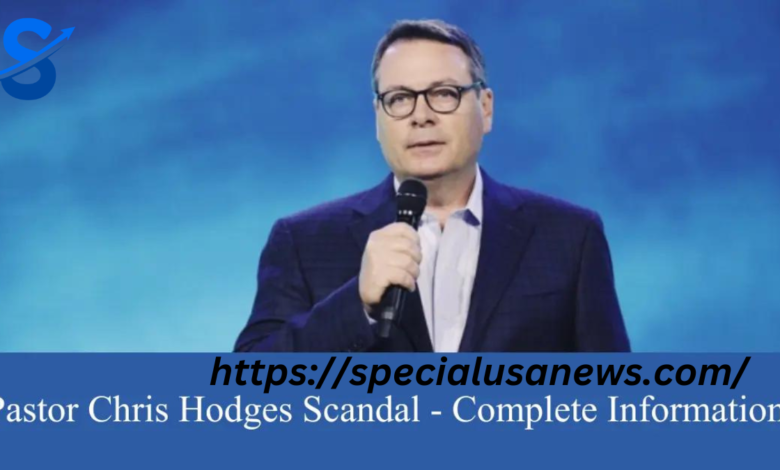Pastor Chris Hodges Scandal: Breaking Down the Controversy

Introduction to Pastor Chris Hodges Scandal and his ministry
The world of ministry often finds itself in the spotlight, and sometimes that light casts shadows where we least expect them. Pastor Chris Hodges, a prominent figure in the Christian community and founding pastor of Church of the Highlands, is no stranger to public attention. However, recent events surrounding him have sparked a firestorm of controversy that has left many questioning his integrity and leadership. This blog post aims to dissect the unfolding drama tied to the Pastor Chris Hodges scandal: breaking down its complexities while shedding light on how it affects both his ministry and its devoted followers. Join us as we navigate this turbulent chapter that raises critical questions about faith, accountability, and redemption within the church community.
The Controversy Unfolds: What Happened?
The controversy surrounding Pastor Chris Hodges began to surface in late 2022. Allegations emerged related to financial mismanagement within his megachurch, Church of the Highlands.
Questions arose about extravagant spending and whether church funds were used appropriately. This sparked outrage among some members who felt betrayed by leadership they trusted.
As more details came to light, former associates began sharing their experiences. Some described a culture of secrecy that discouraged transparency regarding finances.
Social media quickly became a battleground for opinions on both sides. Supporters rallied around Hodges, emphasizing his years of service and positive impact on the community.
Conversely, critics demanded accountability and called for an independent investigation into the church’s practices. The tension grew palpable as differing narratives clashed online and in person at congregational meetings.
This situation has left many wondering how such controversies can arise in faith-based communities where trust is paramount.
Criticisms against Pastor Chris Hodges
Pastor Chris Hodges has faced considerable backlash in recent months. Critics have pointed to his lifestyle choices as inconsistent with the teachings of humility and service commonly espoused by Christian leaders.
Many argue that his approach to leadership lacks transparency, raising questions about accountability within his ministry. The glitzy nature of some church events has been labeled extravagant, further fueling discussions on lavish spending versus genuine outreach.
Some former members express feeling alienated when attempting to voice concerns or dissenting opinions. This perception creates a rift between the church’s leadership and its congregation.
Additionally, various online platforms have amplified negative sentiments, leading many to scrutinize both Hodges’ actions and the broader implications for the church community. These criticisms reflect deep-seated frustrations among those who seek authenticity from their spiritual leaders.
Response from Pastor Chris Hodges and his supporters
Pastor Chris Hodges addressed the growing concerns with a heartfelt message. He expressed his commitment to transparency and accountability. Many supporters rallied around him, emphasizing his dedication to faith.
His response included a focus on prayer and unity within the community. Hodges acknowledged the pain felt by many but reassured them of his intention to learn from this experience.
Supporters highlighted his long track record of service and leadership in the church. They pointed out that mistakes can happen, but true character is revealed through responses to adversity.
In various interviews, he reiterated values such as forgiveness and understanding—a reminder of what faith teaches during challenging times. The emphasis was placed on moving forward together, strengthening their mission rather than dividing it further.
Analysis of the Situation
The Pastor Chris Hodges scandal has raised numerous questions about leadership within the church. Key aspects of his ministry have been scrutinized, revealing fractures in trust among congregants.
Critics argue that transparency is essential for any faith leader. Without it, doubts can fester and divide communities. Many followers felt blindsided by the unfolding events, prompting discussions about accountability in spiritual leadership.
Moreover, social media amplified these concerns. Public opinion shifted rapidly as new information emerged. This digital landscape often accelerates heated debates, making it challenging to discern facts from speculation.
Hodges’ approach to conflict resolution also came under fire. Some believe he could have handled communication more effectively during the crisis. The lack of a clear message left room for rumors to thrive and deepen misunderstandings.
As this situation evolves, examining its broader implications on church dynamics becomes crucial—both for leaders and their congregations alike.
Impact on the Church and its Members
The scandal involving Pastor Chris Hodges has reverberated through his congregation and the wider church community. Many members felt a deep sense of betrayal, questioning their faith and the values they upheld.
Attendance at services dipped as individuals grappled with mixed emotions. Some turned away entirely, while others sought solace in group discussions to process the unfolding events.
Leaders within the church faced significant challenges in maintaining unity among congregants. The incident prompted many churches to reevaluate their governance structures and communication practices.
Support groups emerged for those affected, fostering open dialogue about trust and healing. This situation ignited conversations about transparency within leadership roles across various denominations.
As members worked through feelings of confusion and hurt, some found renewed strength in shared experiences—ultimately reinforcing community bonds amid adversity.
Lessons Learned from the Pastor Chris Hodges Scandal
The Pastor Chris Hodges scandal serves as a potent reminder of accountability within leadership roles. Leaders are often held to higher standards, and any discrepancies can lead to significant fallout.
Transparency is crucial in building trust. When situations arise, how leaders respond matters just as much as the events themselves. Open communication can mitigate misunderstandings and foster unity among followers.
This incident also highlights the importance of community support during crises. Congregations must come together, offering grace while holding their leaders accountable for their actions.
It emphasizes the need for personal reflection among church members. Individuals should assess their expectations and beliefs about leadership, ensuring they align with compassion rather than judgment. Learning from such experiences can strengthen faith communities long term.
Moving Forward: Restoration and Healing Process
Moving forward from the Pastor Chris Hodges scandal requires a delicate balance of accountability and grace. The church community is now focused on healing. This involves open dialogue among members, fostering an environment where voices can be heard without fear of judgment.
Restoration initiatives are being introduced to rebuild trust. Workshops, counseling sessions, and prayer groups aim to guide individuals through their feelings about the controversy. These efforts emphasize compassion and understanding as essential components of recovery.
Supporters of Pastor Hodges are also stepping up, working alongside those affected by the scandal. They believe in redemption and hope that this experience can strengthen their faith community.
As time unfolds, patience will play a crucial role in this journey. Healing isn’t linear; it’s filled with ups and downs as everyone processes what has happened in different ways.
Conclusion
The unfolding of the Pastor Chris Hodges scandal has sparked significant conversation and debate in both secular and religious communities. As a prominent figure with a vast following, his actions have not only affected him personally but have also impacted his ministry and its members on many levels.
As we analyze this situation, it becomes clear that scandals are challenging for any organization. They bring to light underlying issues within leadership structures and highlight the importance of accountability. This case serves as a reminder of how essential transparency is in maintaining trust between leaders and their congregations.
Moving forward will require effort from all involved—restoration is possible when there’s a genuine desire for healing. For the church community, this means engaging in open dialogues, fostering understanding, and working towards rebuilding faith among its members.
In times like these, it’s crucial to recognize the potential for growth amid adversity. The lessons learned from Pastor Chris Hodges‘ experience may guide others facing similar challenges while reinforcing resilience within communities of faith around the world.
